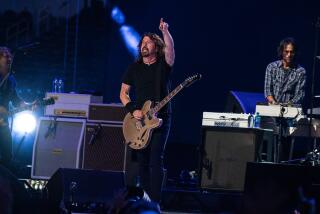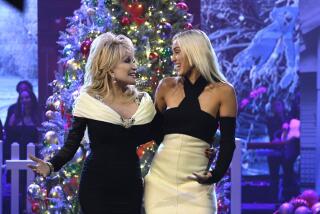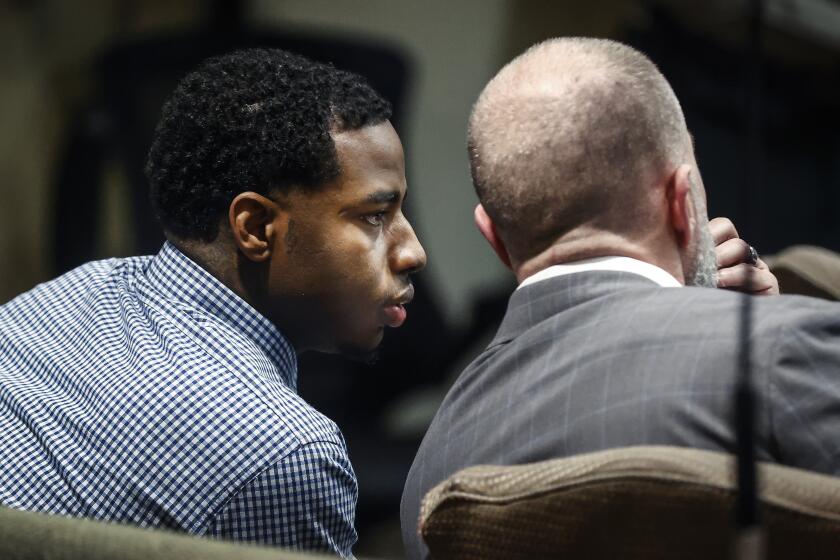Deal Them In: Wild Cards Polish Their Debut Album
The members of the Wild Cards are several days into the recording of their first album, but for the moment music-making has given way to debate.
Holding the floor in the cramped control room of a subcompact-size Los Angeles studio is producer Jeff Eyrich, who has just stopped a tape machine mid-song, bringing the proceedings to an audibly screeching halt.
Eyrich, veteran supervisor of sessions for the Blasters, the Plimsouls and Cheech & Chong, among others, makes the sort of face that comes from biting into something sour. Actually, he thinks he has heard something sour: a chord in a jangling part being laid down by Jesse Reyes, the Wild Cards’ rhythm guitarist.
In a tone that is coaxing rather than rebuking, Eyrich suggests inserting a different chord into the chunky guitar phrase. “An F-natural would sound cool,” he says. “The best way to lead into a minor is with a major. Remember that.”
After a while, Adrian Remijio, the Wild Cards’ guiding musical force, decides that he has heard enough discussion and cuts in emphatically: “The best way to do it is not to talk it out. Just go. Just go for it.”
Just go for it. The thought sums up the instinctive, energetic sound the Wild Cards want to capture on their debut album, “Cool, Not Cold,” which they finished recording last week. It also sums up the expectant mood surrounding the Orange County quartet as it finds itself poised for its first push toward national recognition.
Since 1983, the Wild Cards’ best calling card has been a kinetic, tightly played stage show that features athletic dancing, a flashy wardrobe echoing ‘40s-hipster styles and a broad, shifting mix of musical styles that encompasses swinging jump blues, roots rock, hard funk, sweet soul balladry and Latin music that springs from the four band members’ Latino cultural heritage.
Remijio plays lead guitar and sings lead on most songs; Reyes and his cousin, bassist Johnny Frias, are also featured as singers and generate much of the dancing heat. Jesse Sotelo Jr., nicknamed “Junior,” plays drums and joins in the group’s jazz-style four-part vocal harmonies. A non-performing fifth man, Kent Wilson, writes the band’s lyrics.
While the Wild Cards quickly earned a reputation as a hot attraction on the Los Angeles area club and college circuit, the chance to bring their sound and style to a national audience has evolved slowly.
In 1986, Stephen Powers, a talent scout for Capitol Records, was instantly smitten by the Wild Cards’ live show in a chance hearing at a Santa Monica club. Powers tried to brew a deal for the band with Capitol, but it ultimately did not work out.
In the meantime, Powers became president of his own independent record company, the Hawthorne-based Chameleon Music Group. Last year, Powers, no longer subject to the bureaucratic decision-making process characteristic of major labels, signed the Wild Cards to Dali Records, a Chameleon subsidiary that he owns. While small-label flexibility enabled the Wild Cards to get signed, Chameleon’s national distribution agreement with Capitol will give the just-completed “Cool, Not Cold” some major-label marketing push when it comes out Aug. 24.
The goal for the first Wild Cards album was to capture the exuberance of the band’s live shows, and to create a feeling of stylistic cohesion despite all of the musical genre-hopping.
“I want the album to be raw, highly energetic and really reflect what people would hear from the Wild Cards on a really wild night,” said producer Eyrich, who was assigned to bring the album in on a limited budget that allowed for no more than 18 days in the studio. “I’d like people to hear the record and see them up there dancing. I think it’s in our favor that we don’t have time to polish it and polish it.”
For the Wild Cards, that meant pulling off an acting job, almost a sort of self-deception, in which they had to psyche themselves into believing that they were in the midst of a pumped up show under stage lights, rather than in the austere, controlled surroundings of a studio.
Without an audience to amplify and bounce back the band’s energy, they worked on rousing themselves with humor and banter during some preliminary run-throughs of vocal tracks. Frias and Reyes did a Rocky and Bullwinkle routine while they waited for Eyrich to roll the tape.
Maria Corvalan, who co-manages the Wild Cards with Brian Condliffe, gestured through the control room window for Remijio to uncross his arms, his habitual singing posture when he has no guitar to hold. Eyrich, chewing on a toothpick, peppered the band with wisecracks and good-natured insults.
“Leave your card in the trash can by the door on your way out,” he said, needling a smiling Remijio after one practice take. Then Eyrich called for a new leading man--Frias: “Let’s get a singer with some real sex appeal up there. The pressure is on, Johnny. It’s only a career, man. Don’t worry about it.”
Condliffe, an Englishman who got his start in the music business as road manager for such bands as the Yardbirds, Led Zeppelin and Weather Report, walked in and did a bemused double-take. “That’s a change--first time we’ve seen them smile in the studio.”
What Eyrich said in jest to elevate the mood in the recording studio is also a serious fact confronting the Wild Cards as they try to make their way in a musical world where, as one of their song titles puts it, it is easy to get “Lost in the Shuffle.” It is , after all, a career. And the Wild Cards have certain obstacles to overcome to make theirs a success.
As a stylistically diverse band whose musical range makes it hard to label, the Wild Cards don’t fit easily into rock radio’s square-peg formatting. Like other alternative bands, they will take air play where they can get it--probably from college stations--while relying on their live shows to draw fans and media attention.
“We’re going to be touring as much as we can, everywhere,” said Sotelo.
“That’s the ticket,” Reyes chimed in. “No rest, all work.”
Remijio, the only band member who is married (he and his wife, Delia, are expecting their first child in September), has some misgivings about the tour-until-you-drop regimen that awaits.
“From the little bit we’ve been on the road (a couple of trips to Arizona and Northern California), I hate it,” he said. “It’s something I’ll have to get used to. I get carsick. But once you get there, I love to see different places.”
The band won’t have to wait until its record comes out to begin touring. In a surprise development, a music agent from Edmonton, Alberta, saw two Wild Cards shows last month in Los Angeles, loved them and arranged a tour of western Canada for them that starts Wednesday and continues through early July.
Helped by their image appeal, the Wild Cards have made a favorable impression on other fronts. Country singer Dwight Yoakam, a fan of the Wild Cards’ music, recruited them to add a visual and dancing presence to his recent video, “Always Late With Your Love.” British singer Dave Wakeling, formerly of General Public, also liked the group’s look and had it act the part of his backing band on a recent television appearance that called only for lip-synching.
As the Wild Cards hit the road, they’ll have a sponsor, Miller Beer, helping to promote their appearances with posters and public relations work aimed at drumming up media interest. Phil Janus, spokesman for the Miller Band Network, which sponsors 26 touring acts across the country, said the Wild Cards’ hot live shows had something to do with the decision to sign them up. So did their ethnic identity. “We’re trying to market them to the Hispanic market,” Janus said. “We know they don’t just play that kind of music. But being Latin. . . . “
Being Latin, the Wild Cards have had to face up to being labeled as another Los Lobos--the acclaimed Mexican-American band from East Los Angeles that mixes traditional Mexican folk material with tough blues and anthemic, mainstream rock.
At gigs, Reyes said, “Right away they’ll shout out, ‘Play “La Bamba,” ’ “ the Mexican song that Los Lobos re-created--and scored a No.1 hit with--in the movie of the same name.
The song isn’t in the Wild Cards’ repertoire. In fact, they are not even strictly a Mexican-American band. While Remijio and Sotelo have Mexican roots, cousins Reyes and Frias are from Puerto Rican and Filipino backgrounds.
“We try to win people over, do things our own way,” Sotelo said. “We joke with them (when audiences ask for ‘La Bamba’). It’s something we’ve got to live with. But our thing is to go out there and change their mind, to get them to look at us not as a Los Lobos band, but as the Wild Cards.”
Powers, the Chameleon Records president, said the Wild Cards were sensitive about ethnic stereotyping when he began working with them two years ago, but they have grown more willing to let Latin roots emerge in their music.
“They wanted to be thought of as a band, not as a Latin band,” Powers said. “But in their maturity, I think they’ve realized, ‘This is our strength, this is who we are.’ ”
“Cool, Not Cold” will include one song in Spanish. But rather than reaching for Mexican folk roots, like Los Lobos, the Wild Cards have turned to the jazzy Salsa music of Cuba and Puerto Rico, combining two standards, Tito Puente’s “El Agua Limpia Todo” and “La Muerte” by El Gran Combo.
There was one Mexican touch that Remijio had hoped to put on the record. Every day, he brought an old acoustic guitar to the sessions. It had belonged to his father, who died shortly before the Wild Cards began work on the album.
Waiting for a session to begin one afternoon, Remijio shook the guitar and a scaly, gray-green, shell-like object popped out of its sound hole.
It was a rattlesnake’s tail. According to Latin folklore, Remijio explained, rattlesnake charms kept inside a guitar will preserve its sweet tone. Years before, on a family visit to his grandfather’s ranch in Mexico, he watched his father cut the good-luck piece from a freshly killed snake.
In the end, Remijio found, the sound of the old guitar was not right for any of the album tracks. But he was happy with the way the record had come out. Maybe the good luck from his father’s guitar would rub off anyway.
“I really hope something comes out of this record,” he said. “I’ll be really disappointed if it doesn’t because it has a real lot of energy in it.”
More to Read
The biggest entertainment stories
Get our big stories about Hollywood, film, television, music, arts, culture and more right in your inbox as soon as they publish.
You may occasionally receive promotional content from the Los Angeles Times.











